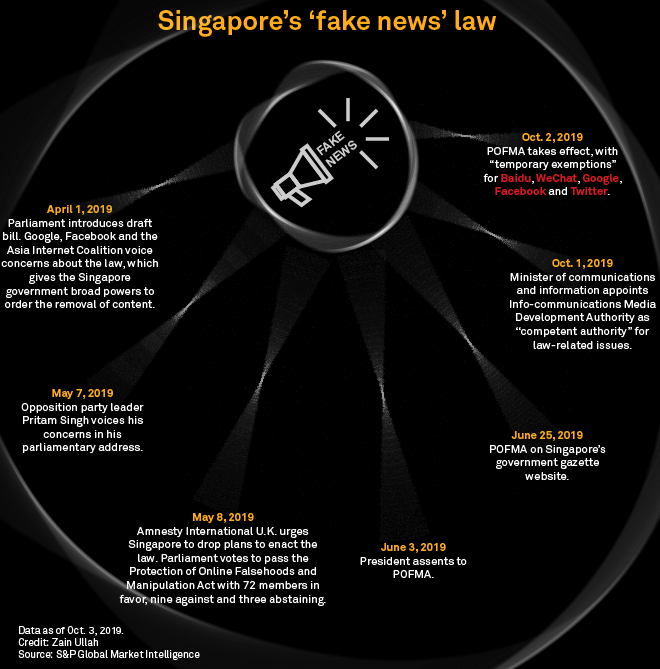Late-stage additions to Singapore's "fake news" law buy Facebook Inc., Alphabet Inc. unit Google LLC and Twitter Inc. much needed time to adapt to the new rules, legal experts said.
The city-state's Protection from Online Falsehoods and Manipulation Act, or POFMA, came into effect Oct. 2, despite opposition from the social media companies and rights organizations. The law, which aims to hold online platforms to account for the spread of misinformation, was first introduced as draft legislation April 1 and passed by local parliament May 8.
Since then, Section 61 has been added, which grants "temporary exemptions" to internet subsidiaries. A ministerial note named Google, Twitter, Facebook, Baidu Inc. and Tencent Holdings Ltd.'s Wechat International Pte. Ltd. as the intended recipients and said the clause was introduced so they would have enough "time to put in place the necessary arrangements and technological measures to enable them to comply with certain requirements of the act."
The temporary exemptions excuse the five internet companies and subsidiaries Instagram LLC and YouTube LLC, from certain protocols such as sending notices to individual end users who have seen the fake news and informing them that the content is false; disabling access by end users to the false content; publishing a notice on the platform informing all end users that the content is false and disallowing a particular user from using the platform's services. There is no indication of how long the exemptions will remain in effect.
Wei Li Fong, Singapore-based lawyer at DC Law said the temporary exemptions should be welcomed by the U.S. tech giants as some of the requirements of the bill are "onerous," and hardware and software will need to be amended to help them comply with the law.
"Some of POFMA's directions may be more challenging to comply with [for these companies than for others]. For instance, complying with general correction direction may not be as straightforward. How will Facebook publish a general notice that is to be seen by all its users, given that Facebook comprises various profile pages, and does not technically have a common landing page, like a website does, that is constantly visible to all users?"
The minister's note states that Facebook and Instagram are exempt from communicating a correction notice through its platform to all end users in Singapore "who access identical copies of the subject material by means of that service at any time."
Jonathan Kok, a Singapore-based partner at RHTLaw Taylor Wessing, said the exemption may prompt the U.S. social media giants to come up with a procedure to show they are tracking their users. Given that their "online platforms have a huge user base," the grace period is necessary, he said.
The temporary exemptions also give the social media companies time to establish a dialogue with the government so that "some degree of regulatory sociability" can take place, Fong added.
The essence of the law, which confers greater powers on the executive, remains the same. Under the law, websites and print publications are required to add warnings or "corrections" alongside statements the government deems false. The bill also states that a government-appointed authority will be given powers to force companies to remove comments that are "against the public interest."
When it was first announced, Facebook voiced concerns over granting broad powers to Singapore's executive branch.
Amnesty International's Regional Director for East and Southeast Asia Nicholas Bequelin said the law "criminalizes free speech and allows the government almost unfettered power to censor dissent" and that it is "worrying" that the law "doesn't even provide any real definition of what is true or false or ... misleading." Singapore's lone opposition party leader Pritam Singh did not agree that the Singapore executive should be the initial decision-maker.
Legal experts said China's big tech players, Baidu and Tencent, will face far fewer implications.
"Chinese companies may already have more experience dealing with governmental restrictions and interventions since, in China itself, the government exercises a high degree of oversight, censorship, and intervention in respect to online content and individual internet users," Fong said.
Due to their operations in China, Fong said companies like Baidu and WeChat may already have internal arrangements, professionals and technologies to deal with content-related issues.
After earlier stating his worries about relying on the Singapore government's full discretion, Jeff Paine, managing director of Asia Internet Coalition, an industry association of internet and technology companies in the region, said in an Oct. 3 statement he hopes the POFMA will be enforced with "transparency and fairness."
In response to the enforcement of the bill, a spokesperson from Tencent told S&P Global Market Intelligence that WeChat is "committed to building an efficient, secure platform for users to stay connected and share information and ideas." Facebook, Twitter, Google and Baidu did not respond to requests for comment on the bill.




